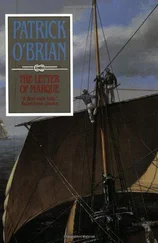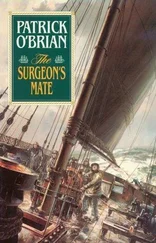Patrick O'Brian - The Ionian mission
Здесь есть возможность читать онлайн «Patrick O'Brian - The Ionian mission» — ознакомительный отрывок электронной книги совершенно бесплатно, а после прочтения отрывка купить полную версию. В некоторых случаях можно слушать аудио, скачать через торрент в формате fb2 и присутствует краткое содержание. Жанр: Книги. Описание произведения, (предисловие) а так же отзывы посетителей доступны на портале библиотеки ЛибКат.
- Название:The Ionian mission
- Автор:
- Жанр:
- Год:неизвестен
- ISBN:нет данных
- Рейтинг книги:3 / 5. Голосов: 1
-
Избранное:Добавить в избранное
- Отзывы:
-
Ваша оценка:
- 60
- 1
- 2
- 3
- 4
- 5
The Ionian mission: краткое содержание, описание и аннотация
Предлагаем к чтению аннотацию, описание, краткое содержание или предисловие (зависит от того, что написал сам автор книги «The Ionian mission»). Если вы не нашли необходимую информацию о книге — напишите в комментариях, мы постараемся отыскать её.
The Ionian mission — читать онлайн ознакомительный отрывок
Ниже представлен текст книги, разбитый по страницам. Система сохранения места последней прочитанной страницы, позволяет с удобством читать онлайн бесплатно книгу «The Ionian mission», без необходимости каждый раз заново искать на чём Вы остановились. Поставьте закладку, и сможете в любой момент перейти на страницу, на которой закончили чтение.
Интервал:
Закладка:
'Yes, sir.'
'Then goodbye to you, Aubrey," said the Admiral, holding out his hand. Yet it was not a human farewell: it was rather a gesture of civility to a being of another kind, very small and far away, at the wrong end of a telescope as it were, a being of no importance, in circumstances of no great importance, that nevertheless had to be dealt with correctly.
Only twice had Jack felt that the Admiral was still in contact with the ordinary world: once when he gently put his foot on the pug's back to stop it wheezing so loud, and once when he said 'leaving this station'. It was common knowledge that the Ocean was sailing for Mahon and Gibraltar in the morning, but the Admiral's meaning would have been clear to a man with even less religious sense than Jack Aubrey and the tone of unaffected humility and resignation moved him deeply.
Returning to the fore-cabin he found Stephen there with Mr Allen and Professor Graham. 'Captain Aubrey,' said Stephen, 'I have been telling Mr Allen that I must decline going with you to Admiral Harte's apartment. There are circumstances that make it improper for me to make any official appearance in this matter or in any other to do with Intelligence at present.'
'I quite agree,' said Graham.
'Besides,' added Stephen, 'I have to see Dr Harrington and our patient in fifteen minutes.'
'Very well,' said Allen. 'Then I shall send a messenger to tell Dr Harrington that you are here. Gentlemen, shall we wait on the Rear-Admiral?'
Rear-Admiral Harte had never held an independent command of any importance and the prospect of supporting the enormous responsibilities of Commander-in-Chief in the Mediterranean overwhelmed him. Although it was certain that the Admiralty would not leave him in a post so very far beyond his abilities but would send out a replacement as soon as the news of Admiral Thornton's incapacity reached London, Harte's manner and even his appearance were almost unrecognizable. His ill-looking, foxy, close-eyed face wore a look that Jack had never seen on it before, although they were old, old acquaintances -a look of earnest gravity. He was civil to Jack and almost deferential to Allen and Graham, who for their part treated him with no extraordinary respect. Harte had at no time been admitted to the Admiral's confidence in anything but purely naval matters: he knew almost nothing of the deeply involved political situation and nothing whatsoever about the Admiral's frail network of intelligence. Allen gave a short account of the position in the Seven Islands, and Harte could be seen straining his weak understanding to follow it:
'Now, sir,' said Allen, 'I advert not to the Seven Islands as such but to their former allies and dependencies on the mainland, particularly Kutali and Marga. As you know, the French are still in Marga, and they seem to be as firmly settled there as they are in Corfu: yet a little while ago it was represented to the Commander-in-Chief that the possessor of Kutali could cut Marga's aqueduct and take the town from behind; while a friendly base at Kutali would make it far easier for us to attack Paxo and Corfu, which even Buonaparte calls the keys of the Adriatic.'
'We are to take Kutali, then?' said Harte.
'Why, no, sir,' said Allen patiently. 'Kutali is Turkish, and we must not offend the Porte. Any evident, unprovoked aggression in this region would give our enemies in Constantinople a great advantage: it must never be forgotten that the French have some very intelligent men there, that the Sultan's mother is a Frenchwoman, and that Napoleon's recent successes have very much strengthened the French party. But it so happens that the town, which as you will recall was an independent Christian republic before the treaty of Pressburg, lies between three ill-defined beyliks, and its status has not yet been finally decided in Constantinople. The former governor, whose recent death brought this crisis about, was to hold office only while the town's position - its privileges and so on -were considered. It is a valuable place: the neighbouring rulers covet it exceedingly and two of them, Ismail and Mustapha, have already approached us for help, while the agent of the third is thought to be in Malta at present.'
'What kind of help do they want?' asked Harte.
'Guns, sir, and gunpowder.'
'Guns!' cried Harte, looking at the others: but he said no more, and when first Allen and then Graham explained that in the outlying provinces of the Turkish empire the valis, pashas, agas and beys, though in principle subject to the Sultan, often behaved like independent rulers, increasing their territories by usurpation or by making open war upon one another, he looked displeased.
'Ali Arslan of lannina defeated and killed the Pasha of Scutari not long since,' said Graham. 'It is true that Scutari had rebelled: but the same cannot be said for the Derwend-Pasha of Rumelia, nor of Menoglu Bey.'
'The independence increases with the distance from Constantinople,' said Allen. 'In Algiers, for example, it is virtually complete, but here it is usually exercised with a certain discretion. They often go to war with one another, but they generally do so with cries of loyalty to the Sultan, for although the Porte will acquiesce in a fait accompli if it is accompanied by the proper offerings, a reasonably good case still has to be made out - the defeated man must be shown to have had treacherous intentions or to have been in correspondence with the enemy.'
'And except in cases where the pasha or vali throws off his allegiance and goes about to cut himself out a completely sovereign state, as Scutari and Pasanvoglu did not long ago and as Ali Pasha will almost certainly do as soon as he can be sure of the Morea- except in cases of total rebellion, I say, the Sultan's direct appointment is respected in these parts, when at last it is forthcoming in the form of an irade or firman,' said Graham. 'The Sultan's irade is sacred, except to rebels.'
'That is why all three beys also have their agents busy in Constantinople, jockeying for position,' said Allen. 'Though to be sure they expect to settle matters much more briskly by themselves, so that the fact of possession, and the increased wealth of possession, may plead in their favour. Unfortunately one of them has also seen fit to make interest with our embassy, which may complicate our task; for whereas the Commander-in-Chief inclines towards Mustapha as a seaman and a former acquaintance - they knew one another when Mustapha was in the Dardanelles - the embassy favours Ismail.'
'Who holds the place at present?' asked Jack.
'The third man, old Sciahan Bey. That is to say he is sitting quietly in the lower town and the suburbs. The Christians, the Kutaliotes, hold the citadel unmolested. For the moment there is an uneasy truce, no one of the three Turks daring to attack for fear of meeting a coalition of the other two, and the Christians biding their time; but the position will change the moment the cannon arrive.' Harte stared for a while and then said, 'So they mean to fight one another, and we are to supply the guns. What do the various sides offer in exchange?' . 'Their promises are the same: they will turn the guns against the French in Marga. Having settled us in Kutali they will join in our attack on Marga, the place being taken before there is time for the French party in Constantinople to interfere.'
'I see. Are the guns available?'
'Yes, sir. Two small transports have been prepared and are lying in Valetta. The trouble is we do not know which of the claimants to trust. Ismail openly states that General Donzelot, the commander of Corfu, has made him offers; but this may merely be intended to raise his price. Mustapha says nothing of the kind, but we have a certain amount of intelligence to show that he too may be in contact with the French. So bearing these things in mind, sir, and taking into account the necessity for rapid action, it was thought advisable to send Captain Aubrey, with a political adviser, to view the situation, to meet the beys, to make up his mind on the spot, and, if possible, to carry out the operation.'
Читать дальшеИнтервал:
Закладка:
Похожие книги на «The Ionian mission»
Представляем Вашему вниманию похожие книги на «The Ionian mission» списком для выбора. Мы отобрали схожую по названию и смыслу литературу в надежде предоставить читателям больше вариантов отыскать новые, интересные, ещё непрочитанные произведения.
Обсуждение, отзывы о книге «The Ionian mission» и просто собственные мнения читателей. Оставьте ваши комментарии, напишите, что Вы думаете о произведении, его смысле или главных героях. Укажите что конкретно понравилось, а что нет, и почему Вы так считаете.












